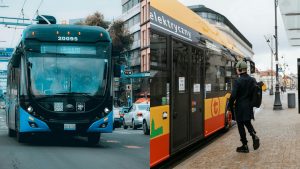
In recent years, there has been a growing concern about the impact of transportation on the environment. This has led to a rise in the use of alternative modes of transportation, such as electric vehicles and bicycles. Delhi, a city known for its traffic congestion and air pollution, has taken a step towards a green future by introducing 3,000 electric scooters and cycles in Dwarka. This initiative is aimed at providing a reliable last-mile connectivity solution while also reducing the city’s carbon footprint.
The government has invited proposals for the deployment of high-speed e-scooters, low-speed e-scooters and e-cycles, the statement said. This move is part of the Public E-Scooter Sharing (PeSS) System and Public E-Cycle Sharing System (PeCS) initiative aimed at providing a cost-effective and eco-friendly mobility solution for the residents of the national capital, the statement added.
Also Read: 86% of Bengaluru bus passengers want expansion of bus lane system: Study
“The heart of this initiative lies in our commitment to providing affordable, eco-friendly, and efficient last-mile connectivity options to complement our existing public transport infrastructure, including the metro and buses,” said Delhi Transport Minister Kailash Gahlot. “We have invited proposals from potential service providers for the deployment of high-speed e-scooters, low-speed e-scooters and e-cycles,” he added.
Phase 1 launch
The launch with 1,500 vehicles, will include high-speed e-scooters, low-speed e-scooters and e-cycles. Phase 2 will introduce an additional minimum of 750 vehicles, while Phase 3 will complete the deployment of the remaining 750 vehicles, with the condition that they be offered for long-term hiring or rental.
To be eligible, the bidders must be Original Equipment Manufacturers (OEMs), authorised dealers of OEMs, or fleet aggregators of e-scooters or e-Cycles, the statement said.They must meet a set of technical requirements and achieve a minimum score of 70 marks to qualify. Proof of Concept (PoC) with two operational vehicles at site conditions is also a prerequisite, the statement added.
Also Read: The Indigenous Electric Truck Defying Range Limits
Conclusion
As we look towards the future, let us embrace the potential of electric scooters and cycles as a means to transform our cities and pave the way for a more sustainable and connected future. By prioritizing sustainable transportation solutions, we can create a lasting impact on the well-being of our communities and the environment






